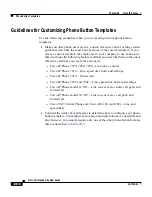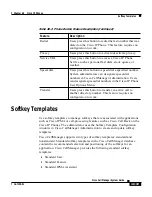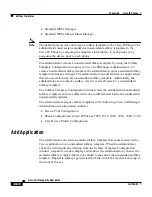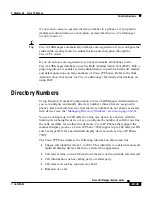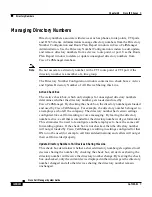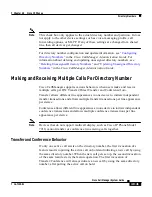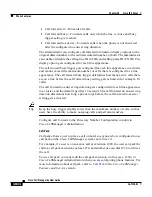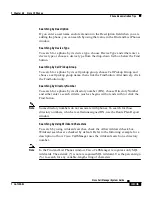
40-27
Cisco CallManager System Guide
OL-7135-01
Chapter 40 Cisco IP Phones
Directory Numbers
•
Cisco IPMA with shared line support allows managers and assistants to share
lines (refer to
Cisco IP Manager Assistant With Shared Line Support
in the
Cisco CallManager Features and Services Guide).
•
Most devices with a shared line appearance can make or receive new calls or
resume held calls at the same time. Incoming calls display on all devices that
share a line, and anyone can answer the call. Only one call is active at a time
on a device. For limitations, see the
“Shared Line Restrictions” section on
page 40-29
.
•
Call information (such as calling party or called party) displays on all devices
sharing a line. If the Privacy feature is turned on by one of the devices, other
devices sharing the line will not see outbound calls made from the device that
turned privacy on. Inbound calls to the shared line will still be seen by all
devices
•
Devices with shared line appearances can initiate independent transfer
transactions.
•
Devices with shared line appearances can initiate independent conference
transactions.
•
Devices with shared line appearance support the Call Forward Busy Trigger
and the Maximum Number of Calls settings. You can configure Call Forward
Busy Trigger per line appearance, but the configuration cannot exceed the
maximum number call setting for that directory number.
The following example demonstrates how three Cisco IP Phones with the
same shared line appearance, directory number 2000, use Call Forward Busy
Trigger and Maximum Number of Calls settings. This example assumes that
two calls occur. The following values have been configured for the devices:
–
Cisco IP Phone 1—Configured for a maximum call value of 1 and busy
trigger value of 1
–
Cisco IP Phone 2—Configured for a maximum call value of 1 and busy
trigger value of 1
–
Cisco IP Phone 3—Configured a for maximum call value of 2 and busy
trigger value of 2
When User 1 dials directory number 2000 for the first call, all three devices
ring. The user for the Cisco IP Phone 3 picks up the call, and the Cisco IP
Phones 1 and 2 go to remote in use. When the user for Cisco IP Phone 3 puts




